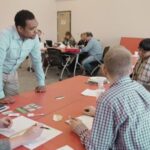In the first part of my professional career, I was managing a mid-sized hotel that catered to business travelers. My role encompassed all facets of the operation, from sales and guest service to housekeeping and engineering. I had developed a solid team of supervisors, each of them very competent and knowledgeable in their area of responsibility. This meant I was ideally positioned to fulfill the number one responsibility of any leader: make sure your team has everything they need to be successful, set clear expectations, and hold them accountable to results. (More on all of those in future posts.)
Leadership during a crisis
I was fulfilling that leadership responsibility one morning through my “MBWA” practice. (Literally, “Management By Walking Around” – you’re visible and present without hovering, available but not waiting for problems to come to you, and observing without inspecting.) Suddenly a housekeeper came hustling toward me down the hall. She had a look of serious concern on her face. She quickly let me know that Lupita, our lead housekeeper, had slipped and fallen while inspecting a bathroom, and likely injured her arm. Barely had I registered that news when Lupita came around the corner, guided by another housekeeper and Jorge, the assistant engineer – and I could tell she was in pain.
We quickly got her to a chair in the lobby to rest, and I could see that Lupita was starting to fade, her face losing its color. My focus was already heightened, but now it took on a new urgency. I directed the front desk to call for an ambulance, called to the restaurant team to bring a glass of water and a cold washcloth, and sent the engineer for a pillow to prop up her injured arm and shoulder. By now, the front of house supervisor Molly had been notified over the radio of the situation, and she had joined the growing party of concerned staff filling the front lobby of the hotel.
A team effort
While my primary concern was for Lupita and her health and wellbeing, I was also aware of the optics of this scene, and its proximity to our hotel guests. Anyone coming or going through the main doors would have to navigate this crowd of not-quite-smiling service professionals. I knew that wasn’t the best first or last impression for our guests to have of our otherwise well-run hotel.
Since Jorge was back with the pillow, I asked him to gather all of the housekeepers into the breakroom for a few minutes to calm down, and then redirect them back to complete their work so our rooms would be clean and ready by the afternoon. Meanwhile, I directed Molly to grab an incident form, so we could document what had happened – and was currently happening – while it was still fresh in our minds.
Lupita was in much better spirits by now, the rest and water and cold compress restoring her strength and overall mood. While we waited for the paramedics to arrive, I asked her to tell me what had happened, while Molly documented the details. It was an innocent mistake: Lupita had stepped into a bathtub to touch up a missed spot on the tile, when her toe caught the edge of the tub and she tumbled inside, her shoulder colliding with the shower wall. The housekeeper with her had thought well enough to call to the nearby team for help in both raising her up and relaying the message to me.
I assured Lupita that professional help was on the way and that she was going to be okay. Since she kept apologizing for the “problem” she had caused, I also had to convince her that she wasn’t in trouble! When she finally smiled and laughed, I breathed a sigh of relief as well.
Awesome adaptability
I failed to mention an important aspect of this story: in addition to keeping a level head and taking command of the situation, I was doing all of the above in multiple languages. For Lupita, her staff, and the assistant engineer Jorge, Spanish was their primary language.
When most of us are faced with a threat or dealing with a stressful situation, some higher-order parts of our brain shut down and divert function to the lower-order processing centers (you may have heard about the “amygdala hijack” – same thing). In this minor crisis situation, I couldn’t reasonably expect Lupita or her team to translate my English into coherent instructions, so I had to do it for them before I gave directions and asked questions. For Molly and the front of house staff, it was back to English for their delegations. All on the fly, with no translation app to help me (not even available back in the day), and necessarily exuding calm confidence throughout.
Leveraging leadership strengths
How did I manage to handle this situation and all of its complications, and lead us to a positive outcome? I leveraged my strengths. If you are familiar with the StrengthsFinder system, you might recognize some of these terms, which are my Top 5 Talent Themes:
- Adaptability
- Strategic
- Input
- Command
- Maximizer
Each theme has certain innate talents, which are “naturally recurring patterns of thought, feeling, or behavior that can be productively applied.” It’s important to know that talents alone aren’t enough to achieve a greater success – you must combine talent with knowledge and skills and practice to turn them into strengths.
I had become more awesome at adaptability, strategy, and taking command over time, with a lot of practice (read: mistakes) along the way. Even though I had a natural tendency to use them, I wasn’t always great at these things. I especially struggled early on in my leadership journey to know when to use which talents, and when to leverage others (or instead, leverage none at all and just seek to learn and understand from the experts around me). You can’t always take command of a team or situation; sometimes, you need to facilitate their own leadership and seek their input about what goals are most important and which methods will work best to achieve them. Awesome leaders know when to be awesome followers as well.
Putting it into practice
In managing this crisis with Lupita – which turned out to be very minor, with nothing broken, and only a few weeks of light duty before she was back to full strength – I had to use my practiced strengths to manage around my known weaknesses. I had very little knowledge of how to assess her injuries, let alone treat them. Having Lupita sit down and drink some water just seemed like the sort of thing you were supposed to do when someone wasn’t feeling well!
And, as adequate as my Spanish language skills were in giving directions and asking basic questions, I knew I wouldn’t be able to sufficiently answer all of the questions the housekeepers would have to restore calm and enable them to complete their work for the day. So I delegated (strategic + command), communicated and translated (adaptability), and managed the optics while ensuring the safety of my employee (strategic + maximizer, maybe!). Everyone had what they needed to be successful in that moment, and I trusted them to execute on my expectations while I focused on the situation at hand.
When the paramedics arrived, I let them take control of the situation (always trust the experts!), and adapted my support role to “paternal translator.” As I facilitated this important medical conversation, there were echoes in the back of my mind from my childhood, when I would exasperatedly ask my mother, a Spanish teacher, “Why do we have to learn this stuff? I’m never going to need it.” Her calm response – a combination of “trust me” and “because I said so” – was enough to quiet me down back then, and it quieted my doubts now about whether I was up to this important task.
Before I hopped in the back of the ambulance with Lupita and the paramedics for the ride to the hospital, Jorge and Molly met me in the lobby. Their confident faces told me the hotel was in good hands, and knowing everything I had done in the past to develop my team and their strengths, I was certain they were right.
How can you be a more awesome leader, even in a crisis?
- Know your strengths
- Leverage your talents and those of your team
- Have confidence in your abilities
It’s important to understand that none of those things will be there in that moment of need if they haven’t been grown and cultivated and developed over time. Becoming a more awesome leader requires practice, adding knowledge and skills to your existing talents, and learning from your mistakes along the way. Confidence in a crisis is earned from remembering when you’ve successfully managed incidents in the past.
Remember: by definition, you can’t be an awesome leader without a team of awesome followers! Take care of your team – grow and cultivate and develop their talents, make sure they have what they need to be successful, and they will be in the best possible position to support the organization’s goals, whatever comes your way.








